The Orange Box Review 358
"PC Gaming is dying," the analysts tell us. "The Massive genre is the only viable business model left," websites report. That they're off the mark is obvious to anyone that's actually played a PC game in the last few years; games like Sam and Max , Battlefield 2 , or any of the numerous puzzle titles available online prove the flexibility and strength of the PC platform. Then, every once in a while, you get an offering like the Orange Box. A value-packed storm of content from Valve, this single sku offers five complete games at an amazing price. That would be great, even if the games weren't any good ... but they are. They're very, very, very good. Read on for my impressions of Half-Life 2: Episode 2, Team Fortress 2, and (the cake is a lie) Portal.
- Title: The Orange Box
- Developer/Publisher: Valve
- System: PC (360, PS3)
- Genre: Story Based Shooter/Team Multiplayer Shooter/Shooter Puzzler
- Score: 5/5 - These games are all classic titles. They transcend genre, and are worth playing by almost any gamer. Certain to be a part of many serious gamers' collections, definitely worth purchasing, and a great value for your dollar.
Given the amount of time it has taken Valve to release this, the next chapter in the Half-Life saga, it's not surprising that their thinking about episodic content has changed significantly. At this point, rather than being a continuation of Half-Life 2, Valve now effectively sees these episodes combined as Half-Life 3. That new focus is evident in Episode Two, in terms of storytelling and pacing. It picks up just a few moments after Episode One left off, with Gordon and Alyx picking their way out the wreckage of a train in the forest outside of City 17. The story almost immediately kicks into gear, hooking you up with members of the resistance, pitting you against an antlion hive, and forcing you to drive through trackless wastes on the way to your ultimate destination. Though there is plenty of action, the storyline of the Half-Life tale is greatly advanced over the course of the game. There are a few answers handed out but, as with any middle child in a trilogy, there are many more maddening questions raised by the events of the game.
More than a year has passed since the release of Episode One, and as a result numerous promises about Episode Two's gameplay have been muddied as a result. Many of the most-discussed new gameplay elements (Strider-busters, open environments) only come into play at the game's climax. Primarily, you'll be following the same sort of well-crafted (but very much walled-in) path seen in previous entries in the series. For some, this may be a disappointment - a more open environment was a much-discussed element of this title during its development. Personally, I was pleased by the game's focus. A Valve hallmark has always been tightly crafted progress, measurable movement through the gamespace. That focus is sharpened to a knife's point in Episode Two, with the intermingling of action, story-based downtime, and quick puzzles being better than ever before. And that climax ... it's essentially a race against time, putting every skill you've learned over the course of three games to the test. It's fantastic.
From an audio/visual standpoint, Episode Two more than meets expectations set by the previous chapters in the series. The new Hunter designs are deadly works of art, and carry a sound design to match their menacing appearance. The imagery of the portal storm left in the wake of Episode One dominates the skyline for much of the game, providing not only a visual landmark but a very concrete reminder of what has come before. The voice acting, as always, hits a high water mark for emotional resonance; and there's quite a bit of emotion to convey in this title. Once again, you're left with a very high opinion of Alyx Vance and the other members of the resistance against the combine.
For me, that emotional connection was the takeaway from this chapter in the series. The gameplay is just as solid as it has been in the past (essentially flawless). Other than hunting the Hunters (they don't like tires in the face much), there weren't a lot of stand out combat or puzzle elements. Which was fine, because I very much focused on the storyline as it unfolded around me. Much like Empire Strikes Back Episode Two ends on a down note, making you question what the future will bring in a hard and sometimes confusing world. Unlike that trilogy, though, the end of Gordon Freeman's tale has yet to be told. Just one more game to go before we find out the ultimate fate of the Freeman.
Team Fortress 2
Team Fortress 2 is a substantial redressing of a venerable entry into multiplayer gaming. Built on the original Half-Life engine, the first Team Fortress game was one of the first examples of role-based team play on the PC. The older game, with its own quirks and peculiarities, is still beloved by thousands of FPS gamers; indeed, some of them feel somewhat put off by Valve's re-envisioning of the game. Grenades are no longer a weapon available to every class, each of the classes has undergone significant retooling, and the unique visual aesthetic more resembles a Pixar film than a hardcore multiplayer shooter. What those changes add up to, though, is one of the most approachable online shooters ever released for console or PC.
Valve has chosen to apply the same kind of design directives to online combat that it applies to the single-player experience of games like Half-Life 2. Playing the game online (there is no single-player component) is like a moment-to-moment tutorial. Nuances of play become obvious as you progress through a match in your chosen class. The Medic profession is the best example of this philosophy. The character's healing gun links him to a particular character, creating a bond between two players who (in all probability) don't know each other. Learning to play the Medic is an interplay between your positioning vs. your partner, your positioning vs. opponents, and deciding when to use the 'invincibility charge' that slowly builds up as you apply healing. As a member of another class you learn the nuances of keeping your healer protected or (if you're on the opposing team) that shooting the medic first is often the best approach.
This 'tutorial-as-you-go' experience applies to every one of the nine classes. The complete team roster is a balanced array of strengths and weaknesses. Assuming that your team can agree to not all play the same class, they should allow either effective offense or defense as the scenario allows. The other Valve hallmark shows up in these classes: they're all fun. Each offers a substantially different play experience, but you can have an amazingly good time with each of them. Whether you're dropping turrets into play or wielding a fast-firing heavy machine gun, you'll have the opportunity to participate and make a dent. And if you're not having fun, it's a matter of a few moment to switch to a different class.
TF2 has some weighty competition in the online FPS space this year, but from what I've seen none can compete with it in terms of approachability. Halo 3 played online is fun, to be sure, but the preternatural skills of your opponents gets really old after a while. Team Fortress 2 rewards skill, to be sure, but the shallowness of the learning curve and self-teaching mechanisms means that expertise in TF2 is a much lower piece of fruit. Ultimately, isn't that the sign of a great online game? One that lots of people can participate in?
Portal
Words are ill-suited tools to describe the sheer amusement value of Portal. At about three hours long, it's one of the shortest games you'll play this year. You have absolutely no offensive weaponry, no special powers, and for most of the game your only real opponent is yourself. It's still, bar none, one of the best games I've ever played. You likely already know the basic premise of the game: you have a gun that makes holes in space. The Portals connect two points in reality and allow movement through them. You'll be using the device to solve puzzles, move through levels, and generally keep yourself alive in the face of the game's environment.
These puzzles are an absolute distillation of the Valve philosophy. Every challenge provides you with all the instruction you need to escape ... though their solutions are not always immediately obvious. Each one is only slightly more difficult than the last, and builds incrementally on every lesson you've previously learned. Portal is not only an excellent game, it's also a microcosmic example of the human learning process. This results, near the end of the game, in astonishing feats you would never have thought possible at the start of your journey. This plottable line of advancement from the simple to the sublime is the core of the game.
That said, more than just fun gameplay makes this title stand out. Aside from the Portal gun, you have but two companions on your journey. The voice from the ceiling, telling you what to do while lying out of one side of her face, is an artificial personality. The other companion is a lifeless cube. If that sounds sort of grimly funny, you're already getting the joke, and the point. Portal is hilarious in an Edward Gorey-meets-Douglas Adams sort of fashion, dark humor mixing with futurism for the sake of futurism.
Portal, then, is funny and intelligent in equal measure. It's wholly unlike anything else released this year, and on its own validates the entry price for Orange Box purchasers. It is, in point of fact, well worth buying all on its lonesome if you are interested by the rest of the offerings Valve has here. It also has the benefit of having the one of the best game songs ever made as its finale track.
Conclusion
Valve's Orange Box is easily one of the best offerings available for any platform this year. It's an amazing value and variety, offering story, online play, and intellectual challenge in equal measure. Every component of the piece is so strong that it could stand on its own - together it's an unstoppable force of gaming goodness. It's worth noting that reality intrudes on every element of perfection - lag has been a problem for Xbox 360 Team Fortress 2 players, but a patch is on the way. Otherwise ... there's really very little to complain about here. It's boring and unfunny to say "the whole thing is terrific" and leave it at that.
But then, I'm a nerd. The whole thing is terrific. In the face of dozens of high-price AAA titles this Christmas season Valve's offering stands out from the crowd with a clusterbomb of content that won't be easily put down. People will be playing TF2 for literally years to come, if you're done with Episode Two you can go back through it gnome-style, and I fully expect Portal to be supported by fan-created rooms for a long, long time. It's well worth buying for anyone that enjoys the first-person perspective on gaming, regardless of what kind of gamer you are. Now if I could only get that song out of my head ...
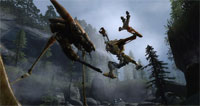
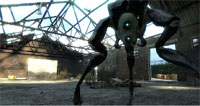
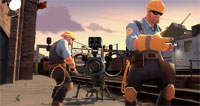
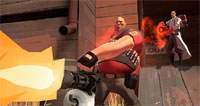
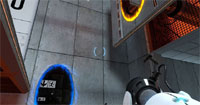
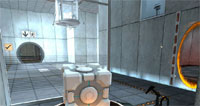
five or three? (Score:1, Interesting)
I don't know much about the game/package, but from what I've seen so far, I'm tempted to pick up a copy. So what are the other two games in the Orange Box? Nowhere in the review does he mention the other two games.
Fortress Forever mod is better (Score:1, Interesting)
Re:WHY? (Score:4, Interesting)
Considering you can buy Portal for $20, and there's bound to be map packs coming out sooner or later, it's a steal. Couple that with modders already combining the game with Half-Life 2 (http://www.primotechnology.com/2007/10/17/half-life-2-portal/) and you have a recipe for long term fun at a cheap price.
The PC isn't dead yet, just resting (Score:5, Interesting)
Console Gaming
Pros
1. Buy once, will last you for five or so years until next console comes out, every game made for it will work for it, no worries.
2. Consoles have gotten more powerful with prettier graphics, intruding into PC territory
3. Perceived as less technically cumbersome than a computer, plug the game in and play
4. Used to be significantly cheaper than a top of the line gaming computer.
Cons
1. Closed architecture system
2. Games not hackable
3. User-created content completely unknown.
4. Getting as expensive as a good computer but with so many restrictions
5. Nobody can make small fun casual games for the system (changing some with the live arcades, but you still have to be vetted by the console manufacturer)
Computer Gaming
Pros
1. People already have a computer for serious work, games are a nice diversion.
2. Computer games could be geekier in subject matter, doing things like RTS or WWII wargames or highly detailed military sims.
3. Total hackability, open architecture, allows an online community with mods, new art, hacks, etc.
4. On the net long before the consoles were -- this advantage is no longer an exclusive.
5. Anyone can make a computer game, there's no barrier to entry for fun casual games.
Cons
1. Computers are expensive as hell, especially if you want to be on the bleeding edge.
2. You could buy a video card that would be good for six months or a Playstation, the price was the same. (Now you have to buy two high-end cards to equal the cost of a PS3.)
3. With the rise in the power of the consoles, computers are taking a beating from the competition
At the point we're at right now, the difference between console and PC basically comes down to the openness of the architecture and the DRM inflicted rather than any other factor.
Re:Portal is an instant classic. (Score:5, Interesting)
Re:WHY? (Score:5, Interesting)
It really is kind of amazing, right? Thinking back, there are no cut scenes, no real expository narration or even dialog. There are just a bunch of meaningless puzzles. Nothing ever tells you what is going on, but there are enough hints that you have a story by the end of it. Pretty much the entire story comes out of hints that GLaDOS doesn't mean to drop, and also crazy graffiti in areas you're not supposed to be able to get to. And yet there's still a pretty engaging story there.
Really impressive, if you ask me. There aren't even a lot of filmmakers or novelists who are willing to show that level of restraint in their story lines.
Re:Orange Box just confirms PC gaming demise (Score:4, Interesting)
I think you've got it kind of backwards there. People buy PCs for non gaming purposes and then choose to buy games as an afterthought a hell of a lot more than they do when they're buying game systems. If I buy a game system, I still need a PC for a large number of reasons. The reverse is not true.
If all the best games are ports of PC games (or simultaneous releases), rather than great console games that are only available on the game platform, there is little reason to get a console in addition to your PC.
Re:More Portal needed!!! (Score:5, Interesting)
You should check out PortalMaps.net [portalmaps.net]. They've already hacked the SDK together and are building new Portal maps.
I've already played the map por_facility_v100, and it's quite good-- a complex map, with lots of puzzles to solve, while introducing new elements (such as buttons that are too heavy for you to open-- only a block will do). Give it a try!
Re:More Portal needed!!! (Score:3, Interesting)
You may be interested in Portal: The Flash Version [wecreatestuff.com]. 2D side-scroller, lacking the GLaDOS AI, but the gameplay is similar and has dozens of puzzles.
Portal is overhyped (Score:3, Interesting)
When I started playing Portal, I liked it very much. The slow progression, the impossible becoming possible, the wacky AI... And then came the last level and the great escape, which seemed like it lasted for ages. It was 1 AM already and I found myself irritated by the longevity of the escape, so I went and found a walkthrough for the few spots I got stuck in. I got tired of experimenting. I wanted it to be over. The very final thing in the game was something I did the next day, and it came down to trial and error. I knew what to do, but I got tired of it all. It wasn't the levels I've been playing earlier, where I had to think and actually have fun.
Then I ventured into the advanced chambers. The first two were easy, the next (15?) I once again knew what to do, but couldn't do it without dozens and dozens of tries to get enough momentum and jump through the field.
Finally I deinstalled the game.
Don't get me wrong, Portal is a fun little game and it was money well-spent, but it has no replayability. I'm not quite sure additional map content would help - once you get the hang of it, there is no challenge in terms of thinking, it's just reflexes and automated portal shooting. Portal here, portal there, ball goes in the collector, elevator comes down, then you shoot around to gain momentum and jump somewhere up high... One interesting little factoid is that several times I found myself saying out loud "How the hell did I just do that?" - I wasn't thinking, I was just doing stuff. (Don't give me any psychobabble about GlaDOS wanting me to do exactly that.)
Dunno... To be honest, the only FPS I've ever played more than once (four times, in fact) was Deus Ex. Maybe merging Portal and Half-Life would be a great game, as others have said already.
A note on Orange Box value (Score:5, Interesting)
Re:Portal is an instant classic. (Score:3, Interesting)
Re:five or three? (Score:3, Interesting)
What about steam? (Score:1, Interesting)
They are also very, very encumbered with intrusive DRM.
You cannot play the non-multiplayer games without an Internet connection.
You cannot sell the games once you are done with them.
I might buy them once they get rid of the handcuffs.
Re:I Am Not Installing Steam (Score:3, Interesting)
Seriously, I have to ask this. I know what Steam does, how it works, and I use it regularly. Where's the beef?
Are people upset that they feel forced to run a background application in order to play games? That I can understand, but if you cared that much about what ran in the background, you wouldn't be bitching about a Windows application because you wouldn't be running it would you?
Does online activation tweak people? I could understand this, if they weren't able to play in offline mode after activating once. This a perfectly reasonable method of copy protection, IMHO, because it does one mostly unobtrusive check and then immediately lets you turn off the net connection requirement to play in the future.
Are they worried about being able to play the game years from now or if Steam up and dies? Okay, understandable - but that's when you check with your friendly neighborhood pirate (If Valve doesn't do something like unlock everyone's copies before shutting off the lights.)
For me, Steam gives me a lot of advantages. I don't have to go to deal with Gamestop idiots. I can preload the game so it takes less time to unlock - even with the inevitable server overload on release days - than it would to install the game from CD or DVD. I can open Steam on a laptop or other computer and play the same games I bought on my desktop without needing to keep CD's handy. And above all else, Valve keeps adding features and games to Steam -beyond- just their own product. It helps to put money in the pockets of developers instead of the publishers, or at least sets up a way that can enable developers to have a lot more freedom in publishing methods down the road.
It's a hell of a lot less "Rental" than any MMO ever has been, and as a running application, Valve's put a good deal of work into making Steam run fairly transparently. On Vista x64 right now, it's using... Ten megs of memory. I think I can spare that, to know that my games are up to date and ready to play at any time I decide I want to.
Re:Portal is an instant classic. (Score:1, Interesting)
Other things of note: the calendars stop at 1983, while Valve has stated the game takes place in 1996 - Chell is one of the daughters brought in on "Take Your Daughter to Work Day", who were kept alive in the little chambers as test subjects by GLaDOS all these years.
There's also a distinct similarity between the inventions of Aperture/GLaDOS (she obviously carried on their research) and the tech used by the Combine. I guess technology is as hard to transport between vastly different universes as Dr Breen was told living things are. After GLaDOS is destroyed, the Combine probably raids the place, and that's where they get their unlimited-ammo bluish machine guns, their energy sphere systems, and their semi-living machines. (I notice they only have very low intelligence on their gunships and striders. Probably a good idea when you see what GLaDOS did.)
Re:1) Fuck SKU (Score:2, Interesting)
On New Years Day this year, my house got burgled. They didn't take much, at least in terms of size; just some packages of meat from the fridge (for some reason), and a 320-disc carry-case of mine containing the majority of my films, CDs, and PC games. Any game in that case that I didn't have installed at the time, I lost. The majority that I did have installed either were unplayable due to requiring the disc to be in the drive at the time, or will be gone at some point in the future either due to uninstalling them to make room for newer games, or if a PC problem/upgrade necessitates a wipe.
The games bought on Steam, however, were all safe. There was no disc to steal. If my computer gets upgraded, wiped, damaged, destroyed or sucked into a hole in space time, no matter; I download Steam onto the replacement system, sign in, and all my games are there to download again. I don't even need to have kept a list of CD keys.
There's a feeling of safety that people get from having the physical media, and I understand that... but from personal experience, it's really not all it's cracked up to be. (Oh, and speaking of cracking up, this is without counting the 2 occasions, 2 PCs, 4 years and 15 miles apart, when a game disc shattered inside the DVD drive, destroying the disc AND the drive. Half Life 1 and Battlefield 2, for reference.)